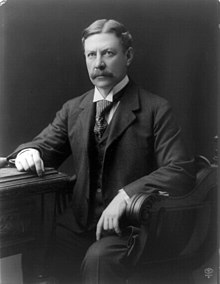William Moody | |
|---|---|
 Moody as Attorney General c. 1905 | |
| Associate Justice of the Supreme Court of the United States | |
| In office December 17, 1906 – November 20, 1910[1] | |
| Nominated by | Theodore Roosevelt |
| Preceded by | Henry Brown |
| Succeeded by | Joseph Lamar |
| 45th United States Attorney General | |
| In office July 1, 1904 – December 12, 1906 | |
| President | Theodore Roosevelt |
| Preceded by | Philander Knox |
| Succeeded by | Charles Bonaparte |
| 35th United States Secretary of the Navy | |
| In office May 1, 1902 – June 30, 1904 | |
| President | Theodore Roosevelt |
| Preceded by | John Davis Long |
| Succeeded by | Paul Morton |
| Member of the U.S. House of Representatives from Massachusetts's 6th district | |
| In office November 5, 1895 – May 1, 1902 | |
| Preceded by | William Cogswell |
| Succeeded by | Augustus Peabody Gardner |
| District Attorney for Essex County, Massachusetts | |
| In office 1890–1895 | |
| Preceded by | Henry F. Hurlburt |
| Succeeded by | Alden P. White |
| Personal details | |
| Born | William Henry Moody December 23, 1853 Newbury, Massachusetts, U.S. |
| Died | July 2, 1917 (aged 63) Haverhill, Massachusetts, U.S. |
| Political party | Republican |
| Education | Harvard University (BA) |
William Henry Moody (December 23, 1853 – July 2, 1917) was an American politician and jurist who held positions in all three branches of the Government of the United States. He represented parts of Essex County, Massachusetts in the United States House of Representatives from 1895 until 1902. He then served in the cabinet of President Theodore Roosevelt as Secretary of the Navy and Attorney General before Roosevelt appointed him to the United States Supreme Court in 1906. He retired from the Court for health reasons after a brief tenure of just less than four years. A progressive like Roosevelt, he opposed racial segregation and spoke out in favor of African-American civil rights.[2]
- ^ "Justices 1789 to Present". Washington, D.C.: Supreme Court of the United States. Retrieved February 14, 2022.
- ^ Frederick B. Wiener, The Life and Judicial Career of William Henry Moody